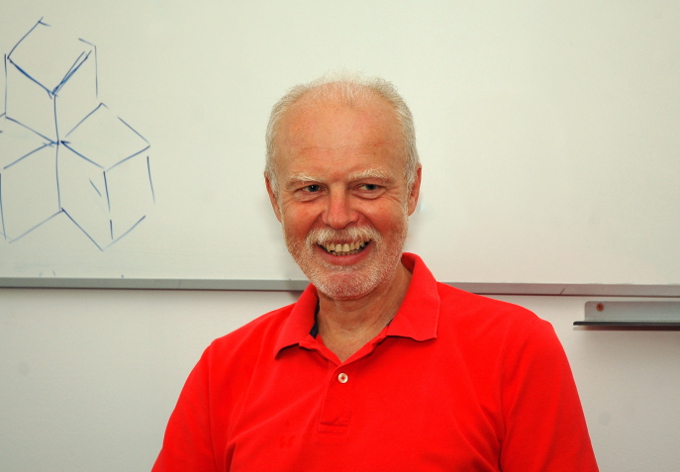News feed
“We wish to elevate our journal to a level, where the BME community considers their own”
2017. 10. 16.Recently renewed English-language journal serving BME and the global researcher community for 60 years.
“Most of BME’s lecturers and researchers treat Periodica Polytechnica as their ‘offspring’, but some fail to make the most of its potential”, stressed László Szirmay-Kalos, professor of the Department of Control Engineering and Information Technology at the Faculty of Electrical Engineering and Informatics and editor of the scientific journal published by the Budapest University of Technology and Economics. “Our main goal is to provide a public platform for the university's lecturers and researchers, as well as the global scientific community to publish their results.”
Originally Periodica Polytechnica covered five areas of science: Architecture (Faculty of Architecture), Chemical Engineering (Faculty of Chemical Technology and Biotechnology), Civil Engineering (Faculty of Civil Engineering), Electrical Engineering and Computer Sciences (Faculty of Electrical Engineering and Informatics) and Mechanical Engineering (Faculty of Mechanical Engineering). The idea behind founding the journal, developed in 1957 by professor of chemistry and former rector of BME Zoltán Csűrös, was to enable the faculties to present their results in their own foreign language periodicals and thus help to establish BME’s international recognition and reputation. From 1972 Transportation Engineering (Faculty of Transportation Engineering and Vehicle Engineering), then from 1993 Social and Management Sciences (Faculty of Economic and Social Sciences) were added to the fields covered by the journals. The editorial board receives around three hundred articles per series and 2-4 volumes are published in a year.
As of last year, Periodica Polytechnica has had a new general editor and the publication has also undergone an image change. “Over the decades we gained a lot of experiences and established our editorial processes”, the researcher recalls. “Ferenc Wettl filled the position of general editor for 15 years, followed by István Kollár for almost three years; they played a crucial part in ‘placing the journal into orbit’. We also felt the need to keep up with the times, so thanks to the previous team the online version was born”.
After professor Kollár’s passing last year László Szirmay-Kalos became the journal’s general editor. “The recognition of scientific journals is somewhat similar to the international rankings of universities: although experts often argue about the methodology of compiling such lists, higher education institutions still aspire to reach high-ranking positions”, says the researcher, adding that the journal’s reputation is also increased by the fact that two of the BME’s three impact factor publications, Chemical Engineering and Civil Engineering, belong to the Periodica Polytechnica series; what’s more, their scientometric indices have been increasing ever since.
|
The impact factor is used to measure scientific performance and is based on the analysis of citations to a journal by showing the average number of citations in the current year to items published in the previous two years. Its calculation is based on the databases of the Thomson Institute for Scientific Information (more recently Clarivate Analytics). Journals first must apply for a selection process, during which their performance is monitored by experts for two years. A journal’s impact factor may change year by year. Journals with a higher impact factor are obviously regarded as more prestigious by the authors. |
Most Periodica Polytechnica volumes have been included in Scopus, which is the largest abstract and citation database of peer-reviewed literature. This achievement is the result of our ambitions for international recognition, our ability to renew ourselves and the selfless and committed work of our editors.
“Science is international: a journal which aims for high standards cannot just be local”, believes László Szirmay-Kalos. “The members of our editorial board work in various universities and research institutes all over the world. Editing is mostly driven by the enthusiasm of our colleagues, since there is no pay, only moral recognition and professional esteem.
One article usually undergoes two or three peer reviews and the author often has to rewrite it several times. The number of articles received is especially high in the case of the impact factor journals. “On average every fifth is approved to be published, which might seem harsh. It is not a nice feeling for a researcher to have their article rejected, however it is also a guarantee that the published papers will be of a high standard, which is especially important for publications during doctoral procedures.
The language of our publications also changed: in the 1950s and 60s they were written in Russian, German and English, while recently papers must be submitted in English.
László Szirmay-Kalos revealed that the journal had undergone an important change in May. The entire process from the peer reviews all the way to publication can be monitored in our electronic editorial system, which has been in use for years, but has been renewed recently. “It is difficult to switch to a new system when you are used to the old one”, stressed the general editor, adding that, all in all, the new version had generated favourable experiences.
“I find it encouraging that many, including the rector, the deans and the editorial staffs at their faculties are one hundred percent behind the journal and we even have some funding from them”, summed up László Szirmay-Kalos. “Our daily editorial work is run smoothly, thanks to our expert colleagues, head of the secretariat Cecília Liszkay and head of technical operations Norbert Radó. We wish to elevate our journal to a level, where an even wider BME community considers Periodica Polytechnica their own, leading to even more incoming articles and citations.”
HA - GI
Photo: Ildikó Takács

